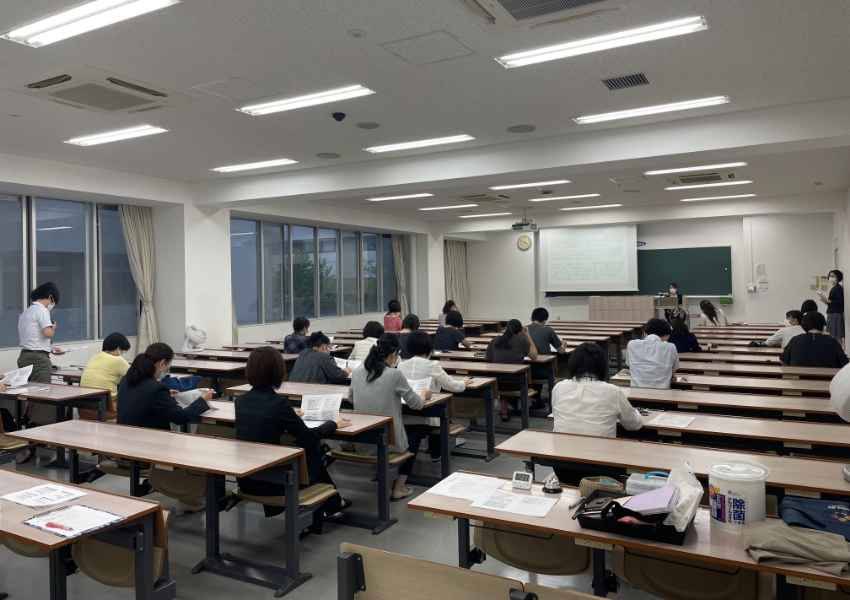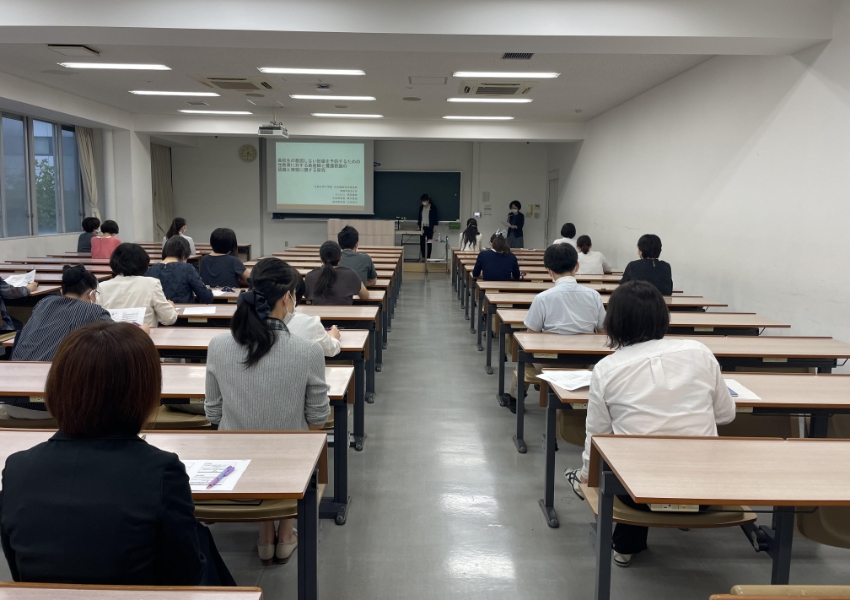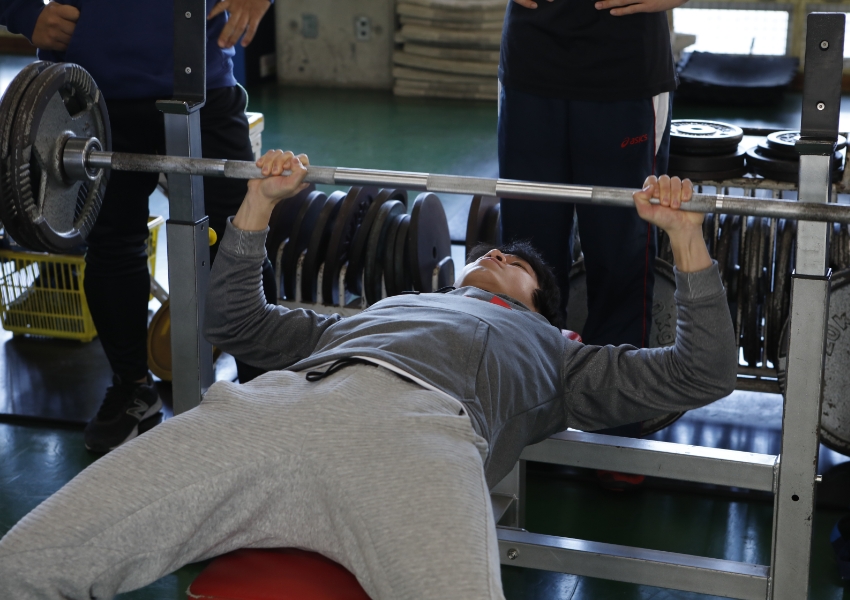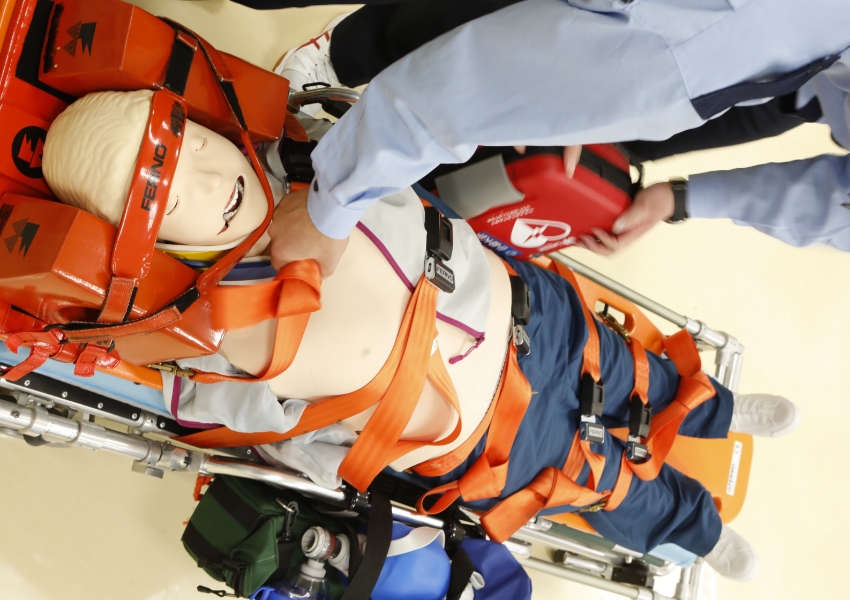About the Graduate School of Life and Health Sciences
Japan faces declining birth rates and an aging society that requires new medical and health professionals.
Chubu University’s College of Life and Health Sciences meets this need by integrating knowledge and skills from various academic fields relevant to health, medicine, disease prevention, welfare, etc. Furthermore, the Graduate School of Life and Health Sciences has been established to assist students in acquiring complex and advanced expertise to meet their academic goals.
The graduate school consists of four departments: Biomedical Sciences (Master’s Course / Doctoral Course), Nursing (Master’s Course), Rehabilitation Sciences (Master’s Course), and Health and Medical Sciences (Master’s Course). Using the keywords of “contribution to the development of health and medical care based on science-based prevention and improvement of quality of life (QOL)” as well as “acquisition of comprehensive capabilities that support expertise on a fundamental level,” the program aims to provide students with advanced expertise on “preventive medicine” and “QOL improvement” based on broad interdisciplinarity and comprehensiveness.
Moreover, students can receive research guidance from multiple faculty members through a tailored program that allows them to select courses across majors and disciplines. To prepare educators and researchers for the future of the field of biomedical sciences, the Department of Biomedical Sciences has established a Doctoral Program. This course is designed to facilitate the learning of working professionals, such as engineers.
Majors
Department of Biomedical Sciences: Master’ Course / Doctoral Course
Modern society faces many health and medical problems that require not only conventional medicine and treatments aimed at ‘curing’ but also development aiming at ‘prevention’ based on scientific evidence.
As a multi-disciplinary field combining medicine, health and hygiene, and engineering based on life sciences, this department employs biotechnology and medical engineering technologies to develop new measures for “prevention” based on scientific evidence.
The Master’s Course consists of (1) Basic Pathophysiology and Medical Sciences, which develops and effectively utilizes the causes and pathophysiology of modern diseases with cutting-edge biotechnology centered on prevention, (2) Environmental Preventive Medical Sciences, which develops and effectively utilizes new methods for preserving and managing the health environment to prevent modern diseases, and (3) Biomedical Technology, which develops materials and equipment necessary for the prevention of the onset of modern diseases and for diagnosis and treatment. Students will select from one of the three areas of “Biomedical Technology” to develop new medical technologies by utilizing the developed materials and equipment effectively. In light of this framework, the curriculum is designed to meet each student’s specific interests and preferences, for example, “I wish to be active in society” or “I wish to be an educator and researcher.” The Doctoral Course aims to prepare educators and researchers to provide leadership in health, medical, and welfare-related research focusing primarily on prevention, as well as educators and researchers who are dedicated to conducting research activities that will advance new health and medical sciences, which will be passed on to the next generation for further development.
Department of Nursing: Master’s Course
In the field of health, medical care, and welfare, which has become more complex and sophisticated with changes in the structure of disease due to an aging society, there is a need for advanced nursing specialists with a wide range of highly specialized knowledge and skills who can respond appropriately to provide safe and secure care.
In this department , students will explore nursing practice based on scientific evidence and create nursing care that incorporates the perspectives of “prevention” and “quality of life improvement.”
They also aim to become advanced nursing professionals who join forces with other health, medical, and welfare professionals to promote care based on scientific thinking.
Students will select their area of specialization from the following three areas: (1) Comprehensive Nursing, which is related to nursing education and nursing management; (2) Life Support Nursing, which is related to adult, gerontological, home health, psychiatric, and community health nursing; and (3) Developmental Nursing, which is related to maternal and pediatric nursing.
In each area, education and research guidance is provided according to the objectives of each individual, such as “I want to develop basic research skills for the exploration and creation of nursing” or “I want to take a leadership role in practice as a clinician.”
In addition, if the prescribed conditions are met, students can obtain a Specialized Certificate (School nurse). This course is accredited by the Minister of Education, Culture, Sports, Science and Technology as a practical and specialized program for mainly working adults under the Program for the Development of Practical Vocational Skills (BP).
Department of Rehabilitation Sciences: Master’s Course
The department of rehabilitation sciences (master’s course) is committed to leading positive changes that transform lives through rehabilitation research, education and practice.
Students will get the knowledge and skills necessary for rehabilitation practice and research from a global and interprofessional perspective.
Study groups in the department of rehabilitation sciences program are composed of professionals from the “rehabilitation functional science” and “rehabilitation therapy science” sectors.
Upon completion students will be capable of leadership and interprofessional practice in the field of “QOL improvement,” “disease prevention,” “health promotion,” “recovery from disorder,” etc.
Students will learn about:
- Globally relevant theories, practices and research in the field of rehabilitation
- How to use innovation, technology, and leadership in rehabilitation to address capabilities and well-being in everyday life
- How to direct focus to health-promoting and enabling measures, ranging from functioning and living conditions of people, to environmental contexts
- How to collaborate in interprofessional and intersectoral teams as well as with various stakeholders in the field of rehabilitation
Department of Health Sciences: Master’s Course
In our super-aged society, there is a growing need for ways to extend healthy life expectancy by preventing or improving lifestyle-related diseases that often affect middle-aged and elderly people, as well as life-style-related inactivity diseases that accompany the decline of life functions.
One way to make this possible is through exercise.
This department fosters professionals who can practice effective exercise instruction for health promotion.
On the other hand, there are cases in which patients are transported to emergency rooms due to various diseases caused by exercise itself.
Since the foundation of health promotion is to ensure “safety,” we will train emergency medical professionals who can respond quickly and accurately to injuries and accidents.
This department has established an educational curriculum that organically combines health enhancement and emergency medicine based on the principles of “prevention,” “improvement of quality of life,” and “health promotion” to preserve and promote human health, and to explore the practice of health care based on scientific evidence.
In this course, we will give consideration to each student’s individuality, willingness to learn, future goals, and study history, such as “I want to become a specialist who has advanced knowledge and skills to achieve health promotion through exercise instruction and who can be active in medical institutions and the community” or “I want to play a leading role as an emergency medical technician with advanced emergency medical knowledge and skills.”
Basic Information
| Established | 2011 |
| Degree | Master’s course: Master of Biomedical Sciences Doctoral course: Doctor of Biomedical Sciences Master’s degree: Master of Nursing Master of Rehabilitation Sciences Master of Health Sciences |
Admission capacity
| course | Total | Biomedical Sciences | Nursing | Rehabilitation Sciences | Health Sciences |
|---|---|---|---|---|---|
| Master’s course (Master’s degree) | 30 | 12 | 6 | 6 | 6 |
| Doctoral course | 3 | 3 | – | – | – |
Number of Full-time Faculty Members
| Professor | Associate Professor | Senior Assistant Professor | Total |
|---|---|---|---|
| 37 | 28 | 10 | 75 |





